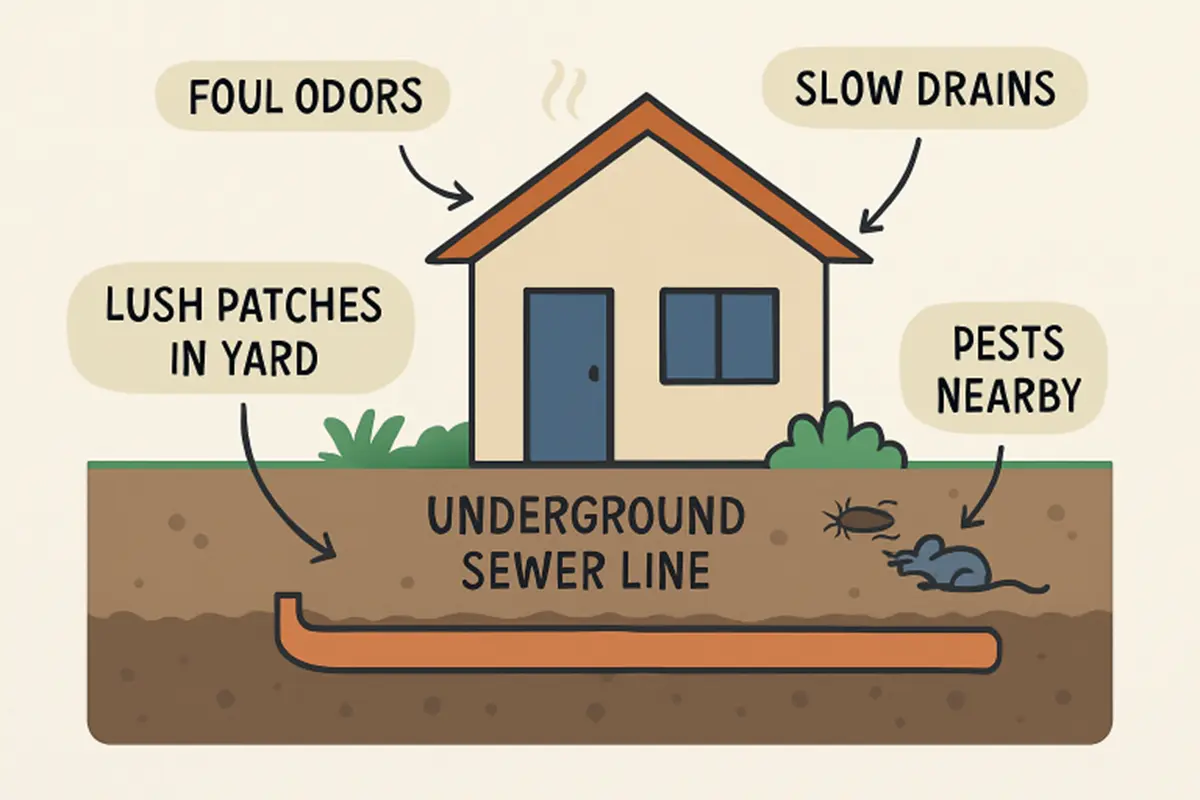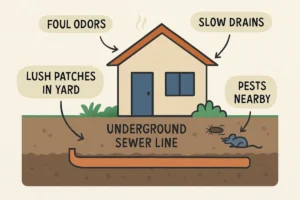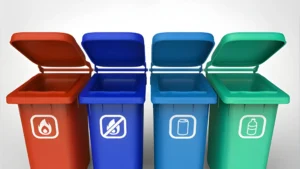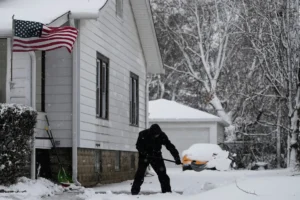Key Takeaways
- Persistent foul odors and unusual noises from drains can signal sewer line problems.
- Slow drainage and frequent backups often indicate blockages or damage.
- Unexplained lush patches in your yard may suggest a leaking sewer line.
- Prompt professional inspection is essential upon noticing these signs.
Table of Contents
- Introduction
- Foul Odors
- Slow Drains and Frequent Backups
- Unusual Noises from Plumbing Fixtures
- Unexplained Changes in Your Lawn
- Increase in Pest Infestations
- Mold Growth and Water Damage
- Foundation Cracks and Structural Issues
- Conclusion
Introduction
Maintaining the integrity of your home’s plumbing system is essential for safety and comfort. Sewer line issues can lead to significant inconvenience and costly repairs if not caught early. Homeowners should look for early clues to trouble, as prompt detection can make all the difference in protecting their property. You can act before these concerns escalate by staying alert to common warning indicators. If you notice any symptoms, contacting a specialized professional service like Denver Sewer and Water ensures that minor issues won’t become financial or structural disasters.
Recognizing the earliest signs of sewer trouble is essential for any homeowner hoping to avoid unnecessary expense and long-term damage. While minor drain issues may seem harmless, repeated problems could signal deeper systemic issues within the main sewer line. Unexplained wet spots in your yard, strange odors, or recurring slow drains might suggest a hidden problem that requires professional intervention. Prioritizing sewer line maintenance keeps your home safe, maintains property value, and avoids health hazards associated with untreated leaks and backups.
Preventive care plays a crucial role in managing the risks associated with sewer line damage. Regular inspections and timely repairs can avoid many costly emergencies. Staying educated on potential warning signs enables immediate action, reducing the likelihood of major disruptions to everyday life. Thorough knowledge of these signals empowers homeowners to better manage their investments.
Neglected sewer line issues can also contribute to water damage, pest infestations, mold growth, and even compromise your home’s foundation. Early awareness and swift professional attention safeguard your property and those who live there. For more in-depth information about common causes and prevention, refer to this Family Handyman resource.
Foul Odors
One of the earliest and most obvious signs of a sewer line problem is the presence of foul odors resembling rotten eggs or the distinctive smell of sewage. These unpleasant smells are often the result of sewer gases escaping through leaks, cracks, or broken seals in the sewer line. Such odors should be addressed immediately, as exposure signals a plumbing issue and poses health risks due to potentially harmful gases entering your living environment.
Slow Drains and Frequent Backups
Regularly clogged or slow-draining sinks, tubs, and showers are another warning sign of trouble in your sewer system. When more than one fixture develops slow drainage, it is likely a sign that the blockage is rooted in the main sewer line rather than within individual pipes. Frequent water backups, especially in basement or lower-level drains, are also key red flags for an impending or existing sewer line failure. Left unchecked, these blockages can quickly lead to flooding or extensive property damage.
Unusual Noises from Plumbing Fixtures
Gurgling, bubbling, or other unusual noises coming from toilets, sinks, or drains are often caused by trapped air within the plumbing system, usually due to obstructions. As water struggles to flow around a clog, it pushes air through the pipes, creating these distinct sounds. Persistent noises are a strong sign that your sewer line is not functioning correctly and should be assessed to prevent larger plumbing emergencies.
Unexplained Changes in Your Lawn
Spotting unexpectedly lush, green patches or persistently soggy areas in your yard could indicate a leaking sewer line underground. When sewage escapes, it enriches the soil with nutrients that spur rapid plant growth. If you notice unexplained wet spots, soft ground, or even small sinkholes forming, there’s a possibility your sewer system is leaking below the surface and eroding your yard’s structure.
Increase in Pest Infestations
A sudden increase in rodents and insects, such as rats or cockroaches, may be linked to a compromised sewer pipe. Sewer-dwelling pests often access homes through cracks in damaged sewer lines. Once inside, they can multiply rapidly, introducing health risks and additional property damage. If traditional pest control efforts aren’t working, having your sewer system checked for hidden breaches that may give pests direct access to your home is worth checking.
Mold Growth and Water Damage
Unexplained mold growth or damp spots on walls and ceilings often suggest leaks in the sewer system behind them. A leaking sewer line raises indoor humidity, creating the perfect environment for mold and mildew. This not only compromises air quality and poses health risks for residents but can also weaken wood, drywall, and other materials over time. According to the Environmental Protection Agency (EPA), promptly addressing moisture and mold can prevent many serious health and structural issues.
Foundation Cracks and Structural Issues
Perhaps the most severe consequence of a leaking or broken sewer line is the development of foundation cracks or visible structural shifts. Wastewater leakage beneath your home can erode the supporting soil, cause slabs to settle unevenly, and result in severe cracks or even sinkholes. As these dangers are not always immediately apparent, it is essential to investigate new or widening foundation cracks as potential signs of sewer line complications.
Conclusion
Staying alert to warning signs such as foul odors, slow drains, unusual noises, unexpected lawn changes, or increases in pests and mold can help homeowners detect sewer line problems early. Timely professional inspection and repairs are vital to preventing serious structural or health consequences. If symptoms appear, consulting a qualified sewer and water specialist ensures practical, effective solutions to safeguard your home.
Also Read-
- Creative Solutions for Quick Home Sales
- Why Downsizing Homeowners Benefit from Fast Sales
- How the Right Words Shape New Construction Homes in Odessa, Texas











